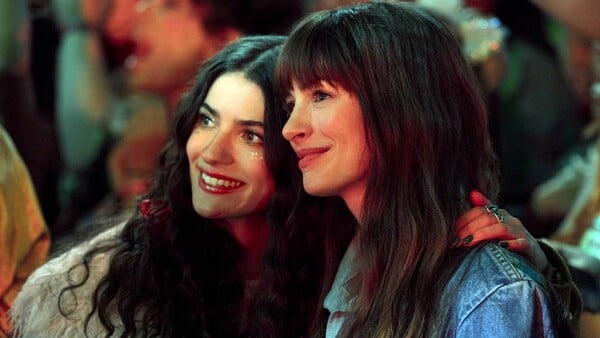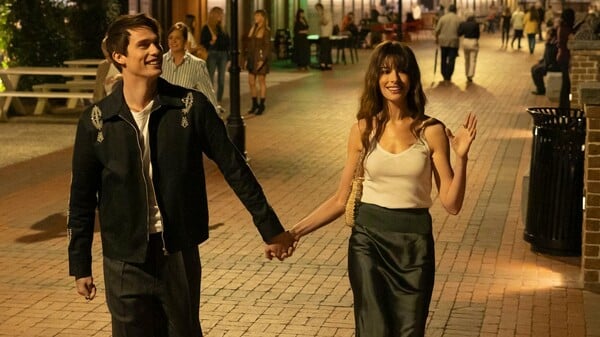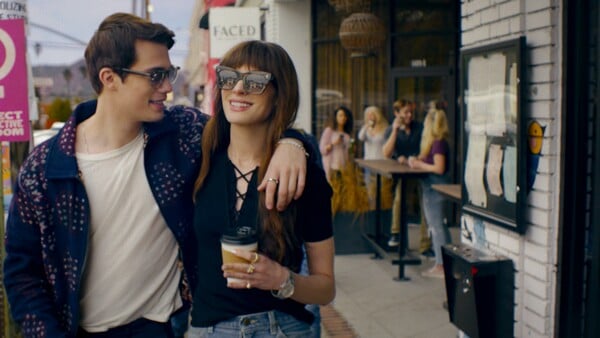For over a decade, romantic movies had nearly disappeared from the cinema halls and major stars were not inclined to prefer them, or rather, the studios did not want to pay the stars to star in such films. In the context of the industry, executives realized that while such a film could generate revenue, it would never achieve the massive opening weekends of fantasy and action franchise films that break records and translate into hefty bonuses for themselves. Culturally, the rise of 9gag and the meme culture played a role. The irony left its alternative platforms and became mainstream to the point of compulsion. As a result, films with romantic elements continued to be made, but these had to be undermined with clever one-liners, meta humor, or jokes that were not part of the story to entertain the awkwardness of the characters, as in the screenplays of the master Richard Curtis, but were included to preempt the potential awkwardness of the audience, who would find the romantic intimacy on the screen “cringe”, and therefore the film “meh” and outdated
Less “com” and more “rom”, “The Idea of You” does not belong to the romance genre that perceives romantic games as a dialogue bravado between lovers, destined to end when the conflicting parties realize that only the happy resolution of their antagonism will bring (mutual) victory. However, some viewers who grew up in the 90s and early 2000s with romantic films found the humorous elements becoming more pronounced in the second half of the decade. At the same time, younger viewers discovered these films on streaming platforms and were captivated by their irresistible simplicity, the attention to detail in their construction, and, of course, the stars themselves. To put it in economic terms and to please our beloved, resourceful executives, the scarcity of romance in the market created a demand for light, untainted romance, and thus the supply came to meet it. “The Idea of You” is part of this return to a cinematic era before cynicism and de-romanticization. Like most films of the genre, it begins with a meet-cute, a cute unexpected encounter, a misunderstanding that brings the lovers together. Here, a forty-something art dealer, accompanying her daughter to Coachella, mistakes a famous boy band member’s trailer for a restroom and meets him that way. At 24, he falls in love with her and pursues her, and thus a romance blossoms
Less “com” and more “rom”, “The Idea of You” does not belong to the romance genre that perceives romantic games as a dialogue bravado between lovers, destined to end when the conflicting parties realize that only the happy resolution of their antagonism will bring (mutual) victory. It is about a love that is pure and healthy, at least in the eyes, minds, and hearts of those experiencing it, a love that will be tested by external forces – here, middle-class values, Pharisaism, and broader gender perceptions. Aside from a conversation between the heroine and her sixteen-year-old daughter, you never feel that what you are hearing from the characters was written with social media reactions and current discussions and trends in mind. There is also no trace of irony towards romantic action and disposition of the spectacle. It is a genuine romantic film from another era, with only the cinematography adopting a more down-to-earth approach compared to the glamorous frames of the past, perhaps even an indie artistic sensibility – the long, color-changing goodbye kiss. With Hattie Hawley, you already imagine her taking on such roles, and whenever someone approaches her to discuss a scene and give her directions, she grabs the screenplay and says, “Give it to me, and I’ll show you how it’s done.” The revelation is Nicholas Galitzine. Without the baggage and established star status of his co-star, but playing the role of a star within the story, Galitzine manages not to get lost in the frame when sharing it with her, mainly thanks to his noble countenance and mellifluous speech. After all, he never needs to surpass Hathaway in radiance; the screenplay treats the characters as equals, and the direction adopts their perspective, never that of an outsider. As for the inevitably eclectic soundtrack, it includes everyone from Maggie Rogers, who just released a delightful new album, to Fiona Apple. Yes, there is a lack of spark-worthy dialogue and originality, but it is compensated by the magnetism of the protagonists, their chemistry, and their unpretentious romanticism. In short, fans of the genre will find the necessary dose in this film
The movie is available on Amazon Prime.
